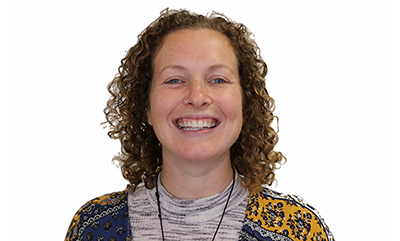‘Everyone Deserves Access to Wellness’.
Ilana Schlesinger is the Wellness Program Coordinator and Advisor at the Graduate Student Life Office for Boston University School of Public Health. We sat down with Ilana to learn more about her role as the Wellness Coordinator and her work on community mediation with the Life on Albany Committee.

Ilana Schlesinger
Breakfast: A mixture of sweet potato, banana, blueberry, hemp seeds, peanut butter, elderberry gummies, and coconut oil
Hometown: New Milford, New Jersey
Extracurricular: Yoga, running, fitness classes, hiking, listening to music, reading, cooking, and staring to the eyes of my cats
What is it like as the BUSPH’s first Wellness Coordinator?
Ever since graduate school, my dream was to work in health education at a university. I really love students, so being the BUSPH’s Wellness Coordinator feels like my dream job. I’m really excited to work with graduate students in particular because there is so much happening at the school of public health. While the wellness programs in undergraduate focus on sexual education and alcohol, I’m more focused more on stress relief, meal prep, and transitioning to adulthood. I really love my job!
What is the importance of mental health in our community?
Society is finally giving mental health the attention that it deserves. There is a cliche: “If you break your arms, you’ll go to the doctor.” A lot of folks feel depressed or anxious, have trauma symptoms, or are struggling with other mental health problems; however, they don’t seek help, because there is still a lot of stigma and shame surrounding mental health. While we are lucky to be in a community that is open to being in therapy, I think that a lot of folks are struggling with mental health. Most folks I’ve interacted with have some level of anxiety and feel that they are unable to do what they love nor express their problems comfortably with others. We are in a major anxiety bubble because it has become normal to feel anxious, overwhelmed, and burnt out. It is a bummer that so many of us are struggling with mental health problems. This is also not getting into depression, bipolar, and psychosis; all these mental health diagnoses deserve our complete attention, respect, and care.
What inspired you to organize a community meditation for the Engagement Center? What do you hope to achieve with this program?
I wanted to see how I can bring wellness to the larger community at Boston University. Before this job, I was working at St. Francis House, a day shelter downtown. There, I was teaching health and wellness. While working there, I realized the absolute need for wellness for this community. There is a lot going on, and everyone deserves access to wellness.
It is quite interesting because when I plan for students now, I typically look back at the curriculum that I made at that job. At the end of the day, stress is stress no matter if you are stressed about where you are going to sleep that night or about an exam. Although these stresses are obviously different, they, however, feel the same in our bodies.
Through this community mediation program, I would love to give folks in the community resources and empowerment to take better care of themselves. It would be fantastic to expose folks to this preventative, non-clinical, and educational approach to relieve their stress and anxiety. I find it important to provide a space where folks can let their guards down, be themselves, and share vulnerable stories with each other without feeling like it’s therapy. It doesn’t always have to be about clinical treatment or recovery.
How are the community meditation sessions structured?
I envision doing a brief 15-minutes check-in with ice breaker questions to provide educational tools that are useful throughout the way. We will then stretch and meditate and have a debrief on how we can use these resources in our daily life. This is a general guide, but I would love engagement and feedback from folks. I am open to feedback to adjust the session to what the folks are looking for!
How can the BUMC community get involved with community meditations?
There will be a sign-up sheet on the Activist Lab website folks can use to be involved with the community meditation once our in-person activities can resume on and off-campus. I believe that it is important to help reduce and relieve stress in our community. We are all human beings. Some of us were luckier than others to be born in a situation, where we can be at an amazing institution like BU; not everyone in our community was born into lucky circumstances, so our community deserves a chance to manage their stress through community meditation.
I also have lots of different sessions and events that address anxiety and burnout. I am trying to work on titles. All the programs that I am doing are focused on building a community among students and addressing stress. Students are always welcomed to visit me during my office hours in the Talbot Building, Room 220-East, when we are on campus, or use this scheduling resource to reach me while we practice good physical (but not social!) distancing. I would love folks to come in and talk about what’s going on‒‒even if they just want to chat! I can refer them to therapy or support groups. I am always here to help and support all the students!
Ilana has created a wide variety of resources for BUSPH students, faculty, and staff to support emotional wellness during the COVID-19 outbreak.